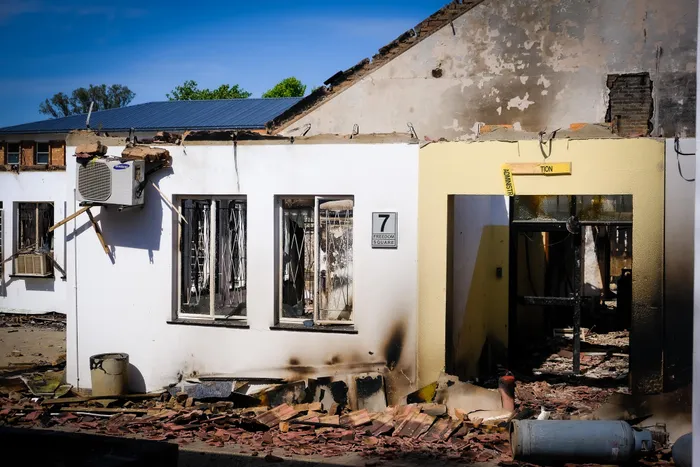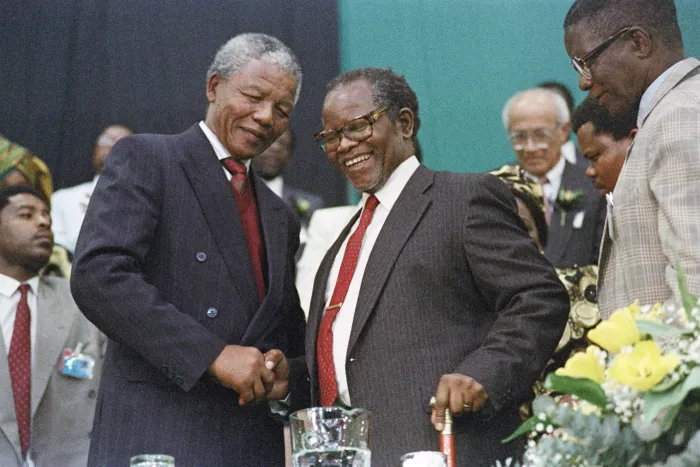Fort Hare University: From Pride to Ruin – A Reflection

The Administration Building, the Senate Chamber, the Examinations Office and the Human Resources Department were among the buildings destroyed during violent protests at the University of Fort Hare. Violence and destruction, intolerance of contesting viewpoints, and inability to argue produce a stunted mindset that can never be liberating, says the writer.
Image: UFH
N Barney Pityana
I am proud to have received my early tertiary education from the then University College of Fort Hare. My activism, however, meant that I was among several students expelled from the university in 1968. We were then protesting the Bantustanisation of this historic liberal and missionary institution. JM de Wet assumed office as Vice Chancellor in July that year, and we protested his appointment to the point of undertaking a protracted sit-down strike and peaceful demonstration.
Since then, I have sought to stay close to the university, and I pledged to support my maiden institution in every way I can. We have also been watching developments at the university over a protracted period. The sense I have is that, in the post-apartheid era, the institution was still as volatile as it was during my time.
And yet, there is reason to believe that Fort Hare today is no longer the same as it was during our time. Academic freedom is held sacrosanct, and progressive research amidst amazing developments has been at play. The university has grown to become once again the pride of the black intelligentsia in our country. Its historic pedigree is invoked with pride, and new academic initiatives have placed Fort Hare among the leading higher education institutions in our country.
I was proud to attend the inauguration of Prof Sakhela Buhlungu as Principal and Vice Chancellor at the University of Fort Hare in 2017. We were full of pride and hope at what promised to be a new era of stability at the university after some years of instability. That was not to be.
The inauguration ceremony itself was marred by protests over a salary dispute by the trade unions. Ironically, this was against a new Vice Chancellor who was clearly being blamed for a breakdown in labour relations that he had inherited. Prof Buhlungu is a highly regarded Industrial Sociologist and industrial relations expert.
At the same time as the Vice Chancellor and Principal was being inaugurated, the Chancellor, my contemporary at Fort Hare and a senior counsel, Advocate Dumisa Ntsebeza, was also inaugurated. The two of them should have been a source of pride for the university.
The years following that, and progressively, with Prof Buhlungu at the helm, were littered by a succession of unfortunate events. All of these can be summed up as corruption embedded at the very heart of the institution: academic fraud involving a senior academic, investigations in supply chain management, and the award of tenders that appeared to be behind the murder of senior executives in quick succession, so much so that the security of the Vice Chancellor himself became a matter of concern. It would not be far-fetched to assume that there were some who harboured ill will towards the university and were determined to destroy rather than build.
Prof Buhlungu was courageous in attending to the establishment of a governance structure at the university, the appointment of a team of academic leadership, improving facilities for teaching and learning, and instilling discipline in management and student affairs. For his efforts and energy, Prof Buhlungu did not make many friends.
It appears that the university had become the feeding trough of elements in business and politics in the region. There was a reported instance, for example, where it was discovered that people who were not registered students were occupying student residencies not allocated to them.
It seems fair to say that at times these wars were being waged against the university that sought order and accountability by recruiting student leadership to fight these wars from within. It does appear that there might be some merit in the complaints by the students about the state of the student facilities, not least their accommodation on campus.
The dispute escalated by September. Students embarked upon a strike. The first time many of us heard about it was the shock of witnessing university buildings engulfed in fire. It was arson. It was deliberate. It was criminal. This happened in the context of strike action by students. Students expressed grievances against the management of student affairs at the university, including accusations of misgovernance against the Council regarding the extension of the Vice Chancellor’s contract.
I pause to observe that in the cooperative governance structure of universities in our country, students are represented in the Council! It is fair to say that relations between Management and the student body broke down. There is no record that we can point to of the exact chain of events leading to the breakdown.
What is even more horrifying is that elements in the community joined the students in the destruction. The fire brigade refused to enter the campus to put out the fires; police also would not intervene; members of the community who were not students participated. University buildings were destroyed, some of them recently renovated or upgraded.
A section of the Administration building housing university records, laboratory facilities where researchers were engaged in some sensitive research, archives, and student records have gone up in smoke. It is fair to say that what was destroyed by fire was more than the physical structures, but the very essence of the university: its intellectual property and resources. That is irreplaceable.

ANC leaders Nelson Mandela and Oliver Tambo exchange greetings at the first ANC national congress to be held on South African soil in Durban on July 2, 1991. Since 1916, Fort Hare has been founded with pride to be the beacon of high knowledge, integrity, ethical leadership, and the recognition of the institution as the means of transformation of society, says the writer.
Image: AFP
In conclusion, I wish to make a few critical points and take a stand:
- Prof Sakhela Buhlungu is a highly renowned academic, sociologist, and academic administrator. He has a distinguished record of service at some of this country’s most esteemed universities: Wits, Pretoria, UCT, and Fort Hare. He is a black scholar of repute. He inherited an institution already in trouble, and he gave everything to endeavour to save it from ruin.
- Shockingly, the Eastern Cape communities do not have it in themselves to support one of their own to do the right thing about their own institution of pride. Prof Buhlungu has become the scapegoat of a failing system of governance and leadership, in a community that ostensibly no longer values morality in public life. This is an opportunity for soul-searching among the people in the Eastern Cape. To see such a venerable institution go up in flames is not an occasion for playing the blame game but of deep repentance and for a collective call for restitution.
- It would appear that the students at Fort Hare and those who support them have no understanding of the purpose of a university. Since 1916, Fort Hare has been founded with pride to be the beacon of high knowledge, integrity, ethical leadership, and the recognition of the institution as the means of transformation of society. The university is not there to enrich some, nor is it merely a basis for acquisition. The motto of the university says it all: in lumine tuo videbimus lumen – in thy light we shall see light. The university shares this motto with the renowned American Columbia University. It seeks to portray that the source of all learning is light and truth. Light enlightens the world and draws others to the source of knowledge. The university is the seeker after truth in research, in teaching, and in its outlook to the world.
- Students and Management must show purposeful, responsible, and ethical leadership. Student leaders who called a strike cannot wash their hands of the consequences of their actions. If they marched alongside members of the community who supported their actions, students cannot then claim that they are not responsible for actions that were not caused by students but by outsiders. That is not credible, and that is not leadership. The student leadership must be held accountable.
- Fort Hare is no longer the institution where the dictates of apartheid are being enforced in the new South Africa. It is now an institution founded on the values of our Constitution. It affirms the democratic values of human dignity, equality, and freedom. It is there to espouse “accountability, responsiveness, and openness.” Above all, the university treasures its purpose that seeks to set free the potential of each person.
- None of that can be achieved in a closed institution. Instead, the institution must promote freedom of thought in the life of the institution, critical engagement on all issues, and the capacity to correct wrongdoing. In such an institution, the power of the imagination and engagement without fear, to be creative. Students and management may be locked in debate and find solutions to the problems of the institution.
- Violence and destruction, intolerance of contesting viewpoints, and inability to argue produce a stunted mindset that can never be liberating. Ideas and the contestation of ideas are the bases on which a university is founded.
- As for the Department of Higher Education, it is not good enough to condemn the criminal violence of the students. It too must take responsibility. At best, the Department ought to establish a commission of enquiry and find the causes of the breakdown in the institution that has cost so much value to South Africa, and propose solutions.
- It is for that reason that many of us are vocal in our support for Prof Buhlungu. We support his endeavours to build a university of stature and eminence, yet that is rooted in its community. We believe that South Africa and the Eastern Cape deserve no less. Nobody is perfect, and leadership is not a popularity contest.
- It is simply untenable that a duly appointed Principal and Vice Chancellor, the chief executive of an institution, could be thrown out of his post by malcontents who fail to articulate their grievance sufficiently to convince others. A university, by its nature, is founded on legality and rationality. Anything else is anathema to the very idea of a university.
- Finally, no university can thrive in its mission without the goodwill and embrace of its critical stakeholders: the business community, workers and students, alumni, and government at all levels are the fulcrum of a university that gives it support to leverage the amazing resources that the university offers. The mission of a university cannot be set apart from the aspiration of the best that the community can imagine for itself.
* N Barney Pityana is Retired Principal and Vice Chancellor: University of South Africa.
** The views expressed do not necessarily reflect the views of IOL, Independent Media or The African.